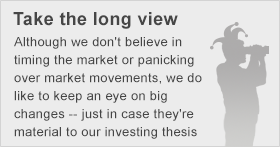
The April employment report released today appears to vindicate the Federal Reserve's confidence in the economy, as U.S. job growth increased at its fastest pace in more than two years last month and the unemployment rate dropped by 0.4 percentage points to 6.3%. U.S. stocks are rising Friday morning, with the benchmark S&P 500 and the narrower Dow Jones Industrial Average (^DJI +0.48%) up 0.38% and 0.28%, respectively, at 10:20 a.m. EDT.
In company-specific news, AstraZeneca (AZN 1.07%) has rejected a second buyout offer from Pfizer (PFE +1.38%). I don't blame the British drugmaker -- it ought to hold out for a higher premium, as Pfizer looks very keen to complete this transaction. In fact, Pfizer shareholders ought to take a close look at the driving rationale behind the deal: It may very well have nothing to do with acquiring a drug pipeline or cutting costs and everything to do with tax engineering.

AstraZeneca wasted no time in rejecting Pfizer's improved offer: The press release announcing the board of directors' rejection followed just hours after the release that confirmed the company had "received an indicative non-binding proposal from Pfizer regarding a possible offer" (ah, corporate speak!).
The terms of the offer have each AstraZeneca shareholder receiving 1.845 shares in the combined group and £15.98 in cash. Based on Pfizer's closing share price of $31.15 on Thursday, the offer is worth GBP50 per AstraZeneca share, a 32% premium to their closing price on April 17, the last day prior to reports of Pfizer's interest and a 7% increase over the initial offer Pfizer made in January. AstraZeneca's shares are essentially unchanged in London today, trading just above GBP48.
Here's how AstraZeneca justified its decision:
The financial and other terms described in the Proposal are inadequate, substantially undervalue AstraZeneca and are not a basis on which to engage with Pfizer. The large proportion of the consideration payable in Pfizer shares and the tax-driven inversion structure remain unchanged.
The first sentence is pretty standard in a mating dance, but it's the second sentence that is more interesting. What is this "tax-driven inversion structure" AstraZeneca refers to?
As part of the deal, Pfizer is proposing to move its tax domicile from the U.S. to the U.K. This isn't incidental to the transaction; as John Gapper wrote [sign-in required] in the Financial Times on Wednesday, "Pfizer's bid would not work financially if it remained a US company because it would shift AstraZeneca's domicile from the UK, where the corporation tax rate is 21 per cent, to the US, where it is up to 35 per cent."
It turns out that the proposed deal is rife with tax advantages: If Pfizer reverses into a foreign equity and its shareholders receive less than 80% of the combined equity, it will circumvent the enormous U.S. tax liability on its foreign earnings. Finally, the U.K. has created a "patent box" tax program that enables companies that carry out research and development in the U.K. to pay just a 10% tax rate on income.
I'm not, in principle, opposed to companies seeking to minimize their tax exposure, but this proposed transaction illustrates that such logic, taken to its extreme, can produce potentially undesirable outcomes. In this case, it looks like the tax considerations trump any strategic logic -- something Pfizer shareholders ought to ponder before they sign off on the deal.
